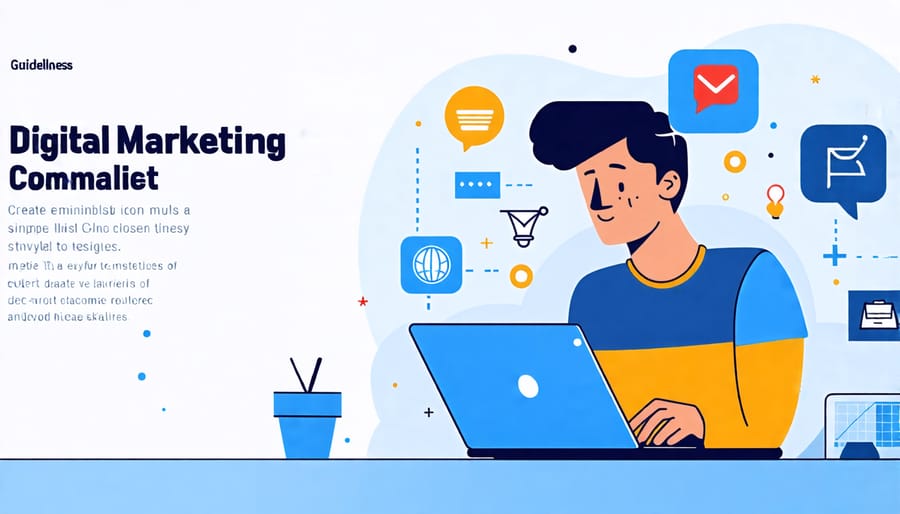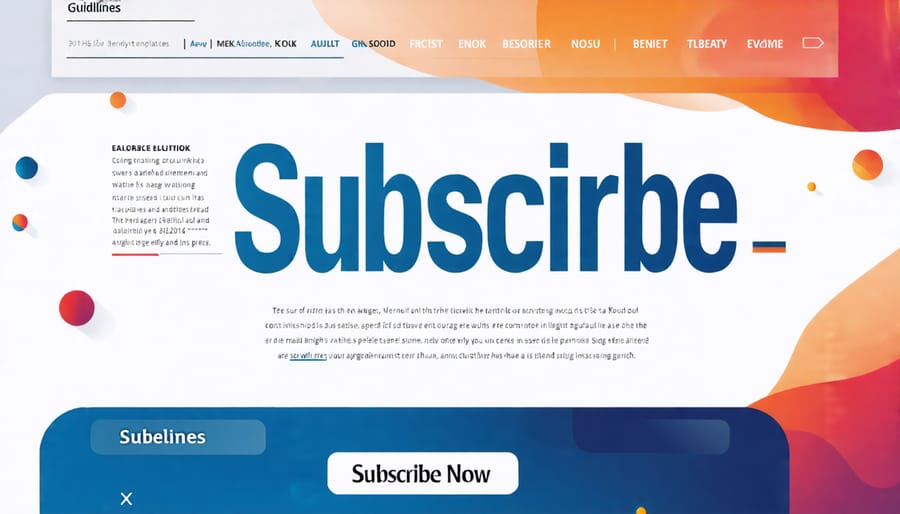Harness the power of social media to engage with your target audience, build brand awareness, and drive website traffic. Create a content calendar, post regularly, and interact with followers to foster relationships.
Optimize your website for search engines by researching relevant keywords, creating quality content, and building backlinks. This will improve your rankings and attract organic traffic.
Leverage email marketing to nurture leads and retain customers. Segment your list, personalize messages, and provide value through newsletters, promotions, and helpful resources.
Invest in targeted online advertising through platforms like Google Ads, Facebook Ads, and Instagram Ads. Set clear goals, define your audience, and monitor results to skyrocket your small business growth while maximizing ROI.
Build a Professional, Mobile-Friendly Website
In today’s digital landscape, having a modern, mobile-friendly website is essential for small businesses looking to attract and retain customers. With more people accessing the internet via smartphones and tablets, your website must provide a seamless experience across all devices. A responsive design that adapts to different screen sizes is critical for ensuring your content is easily readable and navigable, regardless of the user’s device.
When building your website, focus on key elements to include, such as a clear and concise message about your business, easy-to-find contact information, and a user-friendly layout. Incorporate high-quality images and videos to showcase your products or services, and ensure your website loads quickly to prevent visitors from leaving due to frustration.
Other important aspects of a professional website include easy-to-use navigation, a prominent call-to-action, and a mobile-friendly menu. Optimize your website for search engines by including relevant keywords in your content, meta tags, and image alt tags. Finally, regularly update your website with fresh content, such as blog posts or new product offerings, to keep visitors engaged and encourage repeat visits.

Implement Search Engine Optimization (SEO)
Search engine optimization (SEO) is a powerful tool for improving your website’s visibility in search engine results pages (SERPs). By optimizing your site for relevant keywords, you can attract more organic traffic from potential customers actively searching for your products or services. To get started with SEO, focus on keyword research to identify the terms your target audience uses when looking for businesses like yours. Incorporate these keywords naturally into your website’s content, including page titles, headings, and body text.
Another crucial aspect of SEO is creating high-quality, informative content that provides value to your visitors. This can include blog posts, product descriptions, and industry guides. Regularly updating your site with fresh, relevant content helps demonstrate your expertise and keeps visitors engaged. Additionally, ensure your website is mobile-friendly and loads quickly, as these factors significantly impact your search rankings.
Building high-quality backlinks from reputable websites is another effective SEO strategy. Reach out to industry publications, local business directories, and complementary businesses for linking opportunities. By implementing these SEO tactics consistently, you can gradually improve your search rankings and drive more organic traffic to your small business website.

Leverage Social Media Marketing
Identify the Right Platforms
Identifying the right social media platforms is crucial for reaching your target audience effectively. Consider where your customers spend their time online and which networks align with your business goals. For B2B companies, LinkedIn is often a strong choice, while visual-centric businesses may find Instagram and Pinterest more valuable. Facebook and Twitter are versatile options for most industries. To narrow down your choices, research your competitors’ social media presence and engage with your customers to understand their preferences. By focusing on the platforms that matter most to your audience, you’ll maximize the impact of your social media efforts without spreading yourself too thin.
Develop an Engagement Strategy
To boost engagement with your small business on social media and beyond, consider running contests, polls, or giveaways. These interactive tactics encourage followers to actively participate, share your content, and spread brand awareness. Live videos on platforms like Facebook, Instagram, or TikTok are another powerful way to connect with your audience in real-time, showcase your products or services, and answer questions. Regularly posting user-generated content, such as customer photos or testimonials, can also foster a sense of community and trust. Experiment with different types of media, like short-form videos, eye-catching infographics, or behind-the-scenes stories to keep your content fresh and engaging. Lastly, always respond promptly to comments and messages to show that you value your customers’ input and are committed to providing excellent service.
Invest in Content Marketing
Investing in content marketing is a powerful way to attract and retain customers by providing them with valuable, relevant information. By creating high-quality content that addresses your target audience’s needs, interests, and pain points, you establish your small business as a trusted resource and thought leader in your industry. Consider developing a mix of content types, such as blog posts, infographics, videos, case studies, and e-books, to cater to different learning styles and preferences. Focus on topics that showcase your expertise and provide practical solutions to your customers’ challenges. Promote your content through various channels, including your website, social media profiles, email newsletters, and guest posts on relevant websites. Consistently sharing informative, engaging content not only helps drive traffic to your site but also fosters long-lasting relationships with your customers, encouraging loyalty and repeat business. Remember, the key to successful content marketing is to prioritize your audience’s needs over promotional messages, delivering genuine value that sets your small business apart from competitors.
Try Pay-Per-Click (PPC) Advertising
Pay-per-click (PPC) advertising is a powerful way to drive targeted traffic to your website. With platforms like Google Ads and Microsoft Advertising, you can create ads that appear at the top of search results when users search for keywords related to your business. PPC allows you to reach potential customers who are actively searching for products or services like yours. The key to success with PPC is to target the right keywords, craft compelling ad copy, and optimize your landing pages for conversions. Start with a small budget and continuously monitor and refine your campaigns based on performance data. As a Canadian small business, you can also explore local advertising options to reach customers in your area. With a well-executed PPC strategy, you can quickly boost your online visibility and attract qualified leads to your website.
Grow Your Email List
Growing your email list is crucial for effective digital marketing. To start, create a compelling opt-in offer, such as a discount code, free resource, or exclusive content, that encourages website visitors to provide their email addresses. Strategically place sign-up forms on high-traffic pages, like your homepage, blog, and product pages. Use pop-ups sparingly to avoid disrupting the user experience. Leverage social media by sharing a link to your sign-up form and highlighting the benefits of joining your email list. Consider running a contest or giveaway that requires an email address to enter. Collaborate with complementary businesses to cross-promote each other’s email lists. At offline events, collect email addresses through a sign-up sheet or by offering a digital sign-up option. Remember to clearly state what subscribers can expect from your emails and always provide value to keep them engaged.

Partner with Influencers
Partnering with influencers is an effective way for small businesses to expand their reach and build trust with their target audience. Influencer marketing involves collaborating with individuals who have a strong presence on social media platforms like Instagram, YouTube, or TikTok. These influencers have already built a loyal following in your niche, making their endorsement of your products or services highly valuable.
To find the right influencers for your small business, start by identifying your target audience and the platforms they engage with most. Look for influencers whose content aligns with your brand values and aesthetic. You can use tools like Hoot suite Insights or Influence.co to search for relevant influencers based on keywords, location, and follower count.
When reaching out to potential partners, personalize your pitch and demonstrate how a collaboration would benefit both parties. Be clear about your expectations and budget upfront. Remember that micro-influencers with a smaller but highly engaged following can often deliver better results than those with a massive but less targeted audience.
Once you’ve established a partnership, work closely with the influencer to create authentic, engaging content that resonates with their followers. This could include sponsored posts, product reviews, or even takeover campaigns. By leveraging the power of influencer marketing, you can build brand awareness, drive traffic to your website, and ultimately boost sales for your small business.
Optimize for Local Search
For brick-and-mortar businesses, local SEO is essential for attracting nearby customers. When you optimize your online presence for local search, you improve your chances of appearing in relevant local searches and on Google Maps. This increased visibility can lead to more foot traffic, phone calls, and sales.
To get started with local SEO, focus on these key tasks:
1. Claim and optimize your Google My Business listing with accurate information, photos, and customer reviews.
2. Ensure your NAP (Name, Address, Phone number) is consistent across your website, social media profiles, and online directories.
3. Include location-specific keywords in your website’s meta titles, descriptions, headings, and content.
4. Encourage satisfied customers to leave reviews on Google and other relevant platforms.
5. Create local content, such as blog posts about community events or local industry news, to demonstrate your involvement and expertise.
By prioritizing these local SEO tasks, you can improve your search rankings for location-based queries and attract more customers from your area. Remember, consistency and accuracy are key to building trust with both search engines and potential customers.
Encourage Online Reviews
Online reviews are crucial for small businesses, as they heavily influence potential customers’ decisions. Encourage satisfied customers to leave reviews on popular platforms like Google, Facebook, and Yelp. Make the process easy by providing direct links or QR codes leading to your review pages. Consider implementing a post-purchase email sequence that thanks customers and kindly asks for a review. Respond to all reviews, both positive and negative, in a professional manner to show that you value customer feedback. Highlight your best reviews on your website and social media profiles to build trust and credibility. Remember, genuine reviews from happy customers are one of the most powerful marketing tools for small businesses. By actively seeking and showcasing positive reviews, you can attract new customers and solidify your online reputation.
Analyze and Adjust
Tracking the performance of your digital marketing efforts is crucial for long-term success. Regularly monitor key metrics like website traffic, engagement rates, and conversions to identify what’s working and what needs improvement. Tools like Google Analytics, Hootsuite, and Sprout Social provide valuable insights into your online presence. Based on your findings, don’t be afraid to experiment with new strategies or tweak existing ones. A/B testing different ad copy, landing pages, or email subject lines can help you optimize for better results. Remember, digital marketing is an iterative process – by continually analyzing and adjusting your approach, you’ll gradually refine your tactics and achieve your business goals.
Conclusion
In conclusion, these 10 digital marketing strategies offer a wealth of opportunities for small businesses to expand their online presence, engage with customers, and drive growth. From optimizing your website for search engines and leveraging social media to crafting compelling email campaigns and harnessing the power of influencer partnerships, each tactic can contribute to your overall marketing success. Remember, the key is to start small, stay consistent, and continuously track your progress. By monitoring your efforts and making data-driven decisions, you can refine your strategies and allocate resources to the channels that yield the best results for your unique business. So, don’t hesitate – begin implementing these digital marketing ideas today and watch your small business thrive in the online marketplace.
You may also like
-
Revamp Your Small Business: Digital Transformation Success in Canada
-
Transform Your Small Business with Must-Have Automation Tools
-
Boost Your Small Business with Google Analytics: A Step-by-Step Approach
-
Boost Team Spirit Fast: 5-Minute Activities for Busy Small Groups
-
Boost Your Business: Proven Brand Strategy Tips for Small Canadian Entrepreneurs

